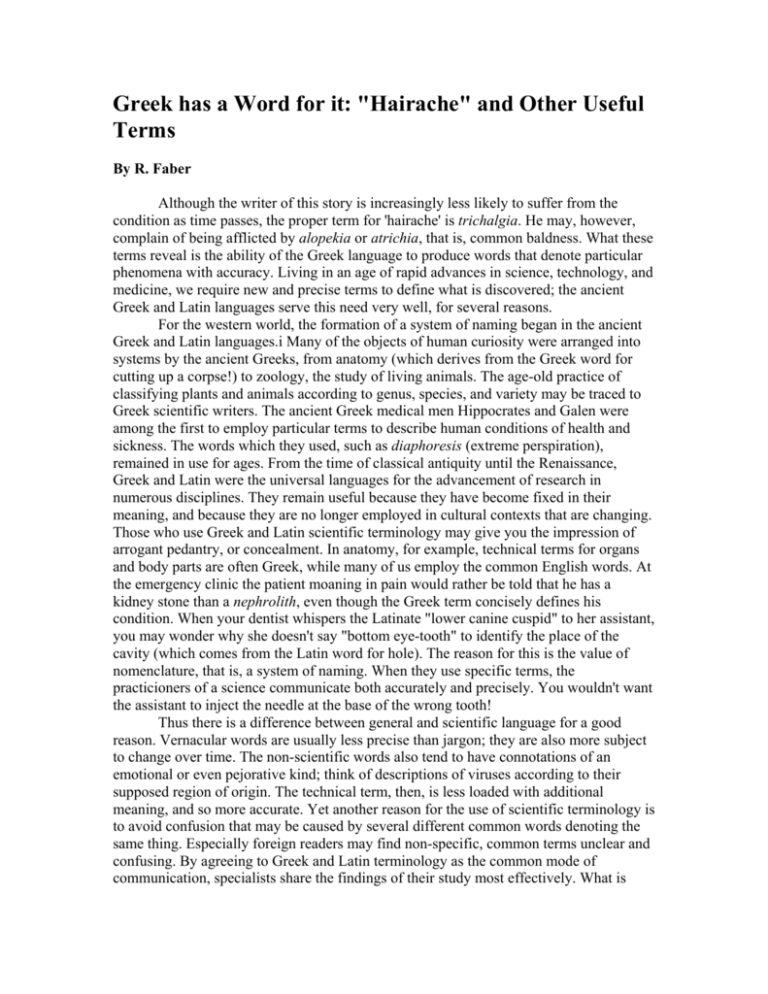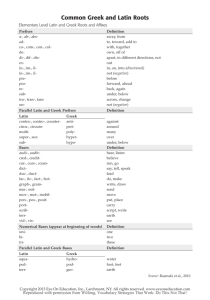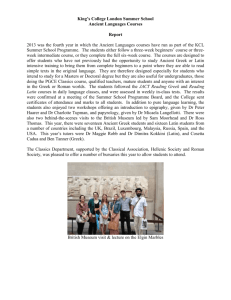Greek has a Word for it: "Hairache" and Other Useful Terms
advertisement

Greek has a Word for it: "Hairache" and Other Useful Terms By R. Faber Although the writer of this story is increasingly less likely to suffer from the condition as time passes, the proper term for 'hairache' is trichalgia. He may, however, complain of being afflicted by alopekia or atrichia, that is, common baldness. What these terms reveal is the ability of the Greek language to produce words that denote particular phenomena with accuracy. Living in an age of rapid advances in science, technology, and medicine, we require new and precise terms to define what is discovered; the ancient Greek and Latin languages serve this need very well, for several reasons. For the western world, the formation of a system of naming began in the ancient Greek and Latin languages.i Many of the objects of human curiosity were arranged into systems by the ancient Greeks, from anatomy (which derives from the Greek word for cutting up a corpse!) to zoology, the study of living animals. The age-old practice of classifying plants and animals according to genus, species, and variety may be traced to Greek scientific writers. The ancient Greek medical men Hippocrates and Galen were among the first to employ particular terms to describe human conditions of health and sickness. The words which they used, such as diaphoresis (extreme perspiration), remained in use for ages. From the time of classical antiquity until the Renaissance, Greek and Latin were the universal languages for the advancement of research in numerous disciplines. They remain useful because they have become fixed in their meaning, and because they are no longer employed in cultural contexts that are changing. Those who use Greek and Latin scientific terminology may give you the impression of arrogant pedantry, or concealment. In anatomy, for example, technical terms for organs and body parts are often Greek, while many of us employ the common English words. At the emergency clinic the patient moaning in pain would rather be told that he has a kidney stone than a nephrolith, even though the Greek term concisely defines his condition. When your dentist whispers the Latinate "lower canine cuspid" to her assistant, you may wonder why she doesn't say "bottom eye-tooth" to identify the place of the cavity (which comes from the Latin word for hole). The reason for this is the value of nomenclature, that is, a system of naming. When they use specific terms, the practicioners of a science communicate both accurately and precisely. You wouldn't want the assistant to inject the needle at the base of the wrong tooth! Thus there is a difference between general and scientific language for a good reason. Vernacular words are usually less precise than jargon; they are also more subject to change over time. The non-scientific words also tend to have connotations of an emotional or even pejorative kind; think of descriptions of viruses according to their supposed region of origin. The technical term, then, is less loaded with additional meaning, and so more accurate. Yet another reason for the use of scientific terminology is to avoid confusion that may be caused by several different common words denoting the same thing. Especially foreign readers may find non-specific, common terms unclear and confusing. By agreeing to Greek and Latin terminology as the common mode of communication, specialists share the findings of their study most effectively. What is more, they can compare the developing knowledge in their own discipline to that in another one more easily when common terms are used. Greek terms have been assumed into the English language in various ways. Some have been transliterated, often under the intermediate influence of Latin. Thus "ameba" comes from the Greek amoibe via the Latin amoeba. The ancient Greek language was particularly open to the joining of two words to form a new one. For example, the ancients described the ostrich as strouthokamelos; this word is formed by combining the Greek for "sparrow" and "camel"; you get the picture. While this word was not adopted into English, many other compound words were: "pachyderm" is formed from "thick" and "skin". It is applied to thick-skinned mammals like the elephant or rhinoceros. Speaking of rhinoceros, this word is formed from rhino ("nose") and keros ("horn"). The hippopotamus, meanwhile, gets its name from its habit of behaving - from the ancient Greek perspective at least - like a horse (hippos) in a river (potamos). Now the reader can no doubt think of many long pharmaceutical or medical terms formed from Greek words that have been joined together in this manner. 'Loan words' is a term that refers to words that are borrowed wholesale, without change, from another language. Many of these terms have become so common that most readers don't sense their foreign origin. "Gingivitis", for example, is now a commonly used term to describe inflamed gums. It is actually a Latin word that means 'swelling of the gums'. The word "gangrene", which describes the death of body tissue caused by restricted blood circulation, is really the Greek word gangraina. At first these terms travelled from Greek or Latin into English as specific words for use in a certain discipline; over time they have become part of common parlance. Lastly, back to the condition of trichalgia. I gather that when one wears long hair in such a fashion that it stands up from the head, the roots, sensitive to the pressure, cause pain, or "hairache". One remedy that comes to my mind is trichotomy: a haircut. i: Several of the observations and examples in this and the following paragraphs derive from O. Nybakken, Greek and Latin in Scientific Terminology (Ames, Iowa, 1959), 9-30.








